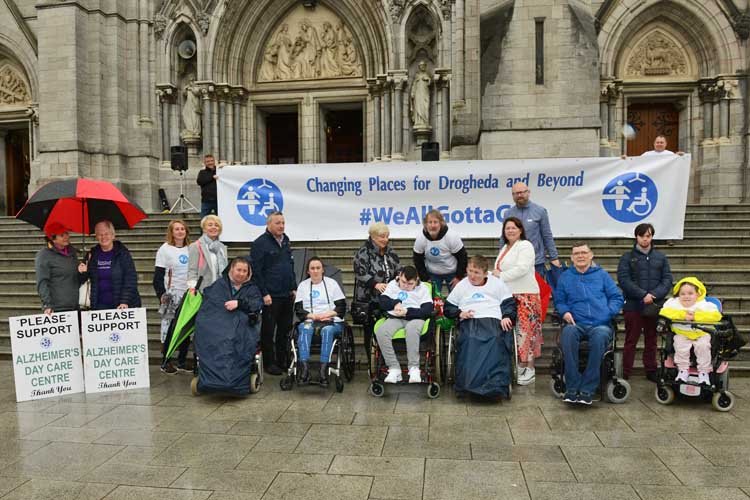By Andy Spearman
It seems odd that, in a country as wealthy as 21st century Ireland, people with a disability who require special toilet facilities should have to campaign for years to gain access to public toilets that they can actually use. But that is what is happening.
Yesterday the local committee of the Changing Places Campaign which is composed of people who are living with a disability, their families and carers, brought their ‘WeAllGottaGo’ campaign to the streets of Drogheda.
Annette Monaghan, whose son Jamie is a wheelchair user who suffers from a rare condition called Trisomy 9 mosaic, has been spearheading the local campaign for several years now.
Annette explained that Jamie, and many other people with a disability, have the special toilets installed at home but the lack of such facilities in public areas means they cannot easily organise a shopping trip or a visit to the cinema because of the lack of toilet facilities they can use.
“A Changing Place is a specialised bathroom for people with disabilities” she explained. It is a spacious (4ft x 3ft) bathroom with specialised equipment that includes a ceiling hoist to lift someone from their wheelchair onto an adult height adjustable table or toilet with space either side for carers to assist in a person’s complex hygiene needs. And a shower is an added bonus to any facility.”
Annette said that it is not just wheelchair users or individuals with severe disabilities that would use such a facility – “In reality many people with hidden disabilities such as crohn’s, spinal cord injury, MS, Strokes Alzheimer’s need to know where they can reach a toilet quickly, that caters to their needs.
‘WeAllGottaGo’ its part of our daily routine, we need to make it easy for people to access a suitable bathroom so they can be included in society.”
There are no Changing Places public toilets in Drogheda and only 17 nationwide and Annette is asking everyone in Drogheda to support the campaign to make it compulsory to have Changing Places style toilets installed in every public building in the country
She is asking you to support the WeAllGottaGo campaign for Changing Place facilities by emailing the minister at buildingstandards@housing.gov.ie before 5pm on 12th May and recommend him to amend the building regulations to enable individuals with a disability to have the same basic human rights, respect and dignity as everyone else.

These sentiments were echoed by several speakers including Geraldine Conway whose son Alex is a wheelchair user and, speaking from her wheelchair, Nicola McDonnell said that people with special needs shouldn’t have to plan their activities around the access to toilets.
Deputy Ged Nash said:”… this is a human rights issue, If there was any other group in society who were being excluded like this there would be absolute outrage. I want to see a change in the law to ensure that we don’t have social exclusion but that this country s all about social inclusion.”
Agreeing with Ged, Deputy Fergus O’Dowd said that he would chase the matter up at Dáil Level. “As you know ha draft regulations have been published and it is up to everyone now to get in their and make their views known on them.”
Independent Councillor Paddy McQuillan, who has been supporting the local Changing Places campaign for several years, told Drogheda Life that individuals who require the use of changing places facilities should have access to them.
“This is a modern society and we should be providing for the most vulnerable members of our communities. Denying them access to such essential facilities is literally forbidding them from participating in cultural, social, and financial activity.
“This is unacceptable. Again I call on Louth County Council to provide a suitable location that can be used as a Changing Places facility and in turn promote social inclusion for all.”
Independent Councillor Declan Power who had a motion passed at Louth County Council in November 2020 to change building regulations for changing place facilities for new public buildings said:
“To amend our building regulations to install changing place facilities for new public buildings will make a significant difference for those with disabilities and those with hidden disabilities i.e. prostate cancer, Crohns disease, etc.
“This will also be a game-changer for the 200,000 carers in this Country who care for loved ones. Many of these carers have to plan their trips and outings around their loved ones needs and often staying close to home due to inadequate toilet facilities. This new legislation is about improving the quality of life, dignity and human rights of a person with special toilet needs.”





